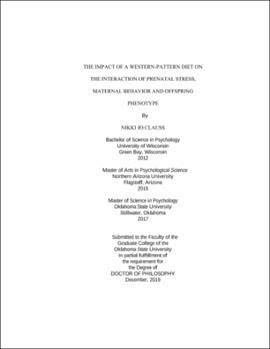| dc.description.abstract | Maternal prenatal stress is a significant source of developmental stress that can leave an epigenetic signature on offspring, leading to stress-related and anxious behavior. A limited amount of work has been accomplished demonstrating that a Western-pattern diet (WPD) during lactation leads to anxiety reduction in juvenile rodents. However, the impact of early developmental experience on the potential neurobiological pathways that contribute to the association between diet and behavior have not yet been elucidated. It is also unclear whether the apparent diet-induced reduction in anxiety-like behavior extends into adulthood, whether it requires a consistent highly palatable diet, or if there are sex differences. To address this gap in the literature, the focus of the current study was to determine whether the impact of prenatal stress could be mitigated by a diet that stimulates the same neuroendocrine systems influenced by early stress. I hypothesized that the lasting developmental effects of stress on anxious behavior would be mitigated by a highly palatable WPD through the upregulation of Dopamine D1 (Drd1) and D2 (Drd2) receptor genes in mesolimbic pathways that have downstream effects on the expression of hippocampal glucocorticoid receptor genes (Gr). Through the use of behavioral and genetic approaches, three aims were addressed: Aim 1 assessed whether offspring lactation diet and prenatal stress interact with the expression of Drd1, Drd2, and Gr to predict offspring anxious-like behavior. Aim 2 determined whether this behavioral phenotype persisted into adulthood and whether it required an ongoing WPD. Aim 3 assessed whether there were sex differences in the models tested. Results demonstrated that offspring lactation diet and prenatal stress (measured via maternal condition) interacted with the expression of Drd1, Drd2, and Gr to predict juvenile anxious-like behavior. As expected, the chow-fed offspring of stressed dams displayed significantly more anxious-like behavior in the open field test than WPD-fed offspring of stressed dams and their non-stressed counterparts. Indeed, the WPD-fed offspring of prenatally stressed dams exhibited a gene expression and behavioral pattern more similar to the control group than to the chow-fed stressed group, and this effect was driven largely by female offspring. For female offspring, this behavior pattern continued into adulthood if there was no change to their post-weaning diet. However, those offspring whose diet was switched at weaning displayed increased anxious-like behavior, whether their mothers experienced prenatal stress or not. Post-weaning diet did not have a significant impact on male offspring behavior. Ultimately, the results of this research help to elucidate the relationship between social environment, underlying genetics of behavior, and shifts in behavior that lead to long term health effects. | |
